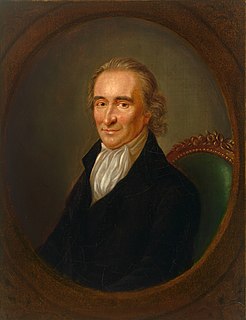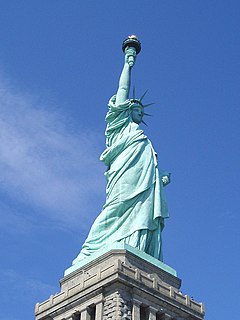
The politics of the Falkland Islands takes place in a framework of a constitutional monarchy and parliamentary representative democratic dependency as set out by the constitution, whereby the Governor exercises the duties of head of state in the absence of the monarch and the Chief Executive acts as the head of government, with an elected Legislative Assembly to propose new laws and hold the executive to account.
A constituent assembly or constitutional assembly is a body or assembly of popularly elected representatives composed for the purpose of drafting or adopting a constitutional-type document. The constituent assembly is a subset of a constitutional convention elected entirely by popular vote; that is, all constituent assemblies are constitutional conventions, but a constitutional convention is not necessarily a constituent assembly. As the fundamental document constituting a state, a constitution cannot normally be modified or amended by the state's normal legislative procedures; instead a constitutional convention or a constituent assembly, the rules for which are normally laid down in the constitution, must be set up. A constituent assembly is usually set up for its specific purpose, which it carries out in a relatively short time, after which the assembly is dissolved. A constituent assembly is a form of representative democracy.
The government of Czechoslovakia under socialism was in theory a democratic one directed by the proletariat. In practice, it was a one-party democratic dictatorship of the proletariat run by the Communist Party of Czechoslovakia, the KSC.

The Congress of the Republic of Colombia is the name given to Colombia's bicameral national legislature.

The Constitution of 1793, also known as the Constitution of the Year I or the Montagnard Constitution, was the second constitution ratified for use during the French Revolution under the First Republic. Designed by the Montagnards, principally Maximilien Robespierre and Louis Saint-Just, it was intended to replace the outdated Constitution of 1791. With sweeping plans for democratization and wealth redistribution, the new document promised a significant departure from the relatively moderate goals of the Revolution in previous years.

The Tennessee General Assembly (TNGA) is the state legislature of the U.S. state of Tennessee. It is a part-time bicameral legislature consisting of a Senate and a House of Representatives. The Speaker of the Senate carries the additional title and office of Lieutenant Governor of Tennessee. In addition to passing a budget for state government plus other legislation, the General Assembly appoints three state officers specified by the state constitution. It is also the initiating body in any process to amend the state's constitution.

France is a representative democracy. Public officials in the legislative and executive branches are either elected by the citizens or appointed by elected officials. Referendums may also be called to consult the French citizenry directly on a particular question, especially one which concerns amendment to the Constitution.
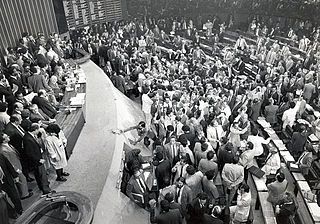
During its independent political history, Brazil has had seven constitutions. The most recent was ratified on October 5, 1988.

Philippine elections are of several types. The president, vice-president, and the senators are elected for a six-year term, while the members of the House of Representatives, governors, vice-governors, members of the Sangguniang Panlalawigan, mayors, vice-mayors, members of the Sangguniang Panlungsod/members of the Sangguniang Bayan, barangay officials, and the members of the Sangguniang Kabataan are elected to serve for a three-year term.

The Congress of the Republic of Peru is the unicameral body that assumes legislative power in Peru. The congress consists of 130 members (congresistas), who are elected for five-year periods in office on a proportional representation basis.

The Constitution of Colombia, better known as the Constitution of 1991, is the current governing document of the Republic of Colombia. Promulgated on July 4, 1991, it replaced the Constitution of 1886. It is Colombia's ninth constitution since 1830. See a timeline of all previous constitutions and amendments here. It has recently been called the Constitution of Rights.
The Constitution of the State of New Hampshire is the fundamental law of the State of New Hampshire, with which all statute laws must comply. The constitution became effective June 2, 1784, when it replaced the state's constitution of 1776.

The House of Representatives is the lower house of the National Assembly of Thailand, the legislative branch of the Thai government. The system of government of Thailand is that of a constitutional monarchy and a parliamentary democracy. The system of the Thai legislative branch is modelled after the Westminster system. The House of Representatives has 500 members, all of which are democratically elected: 375 members were directly elected through single constituency elections, while the other 125 are elected through party-list proportional representation. The roles and powers of the House of Representatives were enshrined in the Constitution of 2017.

The National Assembly is one of the two houses (chambers) of the Parliament of Cambodia. It is referred to as the lower house, with the Senate being referred to as the upper house.

The Constitution of Uruguay is the supreme law of Uruguay. Its first version was written in 1830 and its last amendment was made in 2004.

The government of Niger is the apparatus through which authority functions and is exercised: the governing apparatus of Nigerien state. The current system of governance, since the Constitution 18 July 1999, is termed the Fifth Republic of Niger. It is a semi-presidential republic, whereby the President of Niger is head of state and the Prime Minister of Niger head of government. The officials holding these posts are chosen through a representative democratic process of national and local elections, in the context of a competing multi-party system. Executive power is exercised by the government. Legislative power is vested in both the government and the National Assembly. The judiciary is independent of the executive and the legislature: its Constitutional Court has jurisdiction over constitutional and electoral matters.
In governance, sortition is the selection of political officials as a random sample from a larger pool of candidates, a system intended to ensure that all competent and interested parties have an equal chance of holding public office. It also minimizes factionalism, since there would be no point making promises to win over key constituencies if one was to be chosen by lot, while elections, by contrast, foster it. In ancient Athenian democracy, sortition was the traditional and primary method for appointing political officials, and its use was regarded as a principal characteristic of democracy.
Some type of election in Connecticut occurs annually in each of the state’s cities and towns, the exact type of which is dependent on the year. Elections for federal and statewide offices occur in even-numbered years, while municipal elections occur in odd-numbered ones.
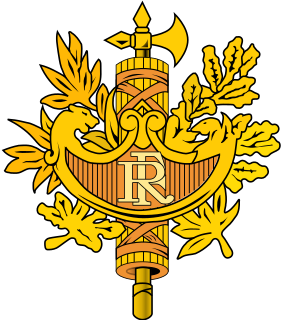
The politics of France take place with the framework of a semi-presidential system determined by the French Constitution of the French Fifth Republic. The nation declares itself to be an "indivisible, secular, democratic, and social Republic". The constitution provides for a separation of powers and proclaims France's "attachment to the Rights of Man and the principles of national sovereignty as defined by the Declaration of 1789."
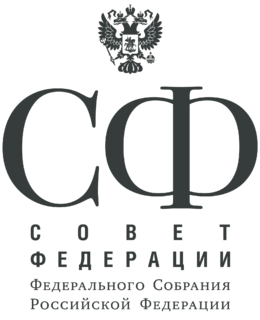
The Chairman of the Federation Council of the Federal Assembly of the Russian Federation, also called Speaker (спикер), is the presiding officer of the Upper house of the Russian parliament. It is the third highest position, after the President and the Prime Minister, in the government of Russia. In the case of incapacity of the President and Prime Minister, the chairman of the Federation Council becomes Acting President of Russia.



